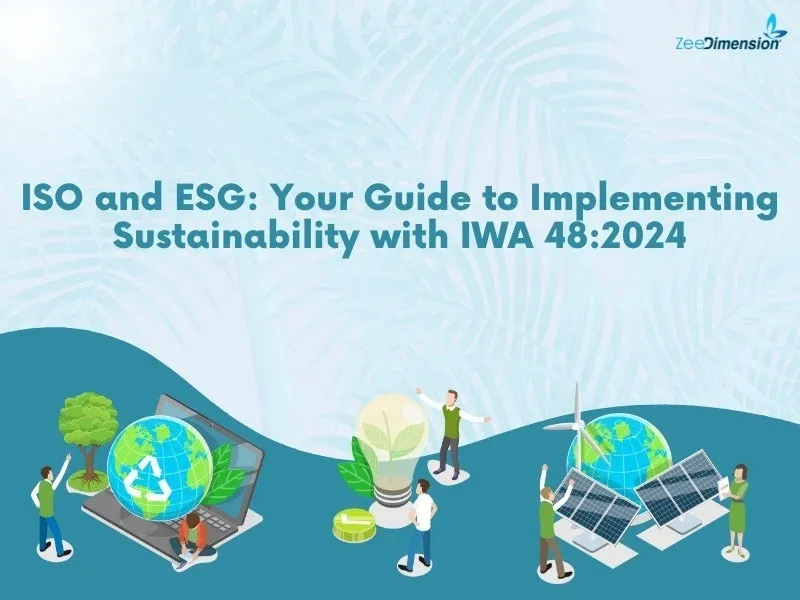
Integrating Environmental, Social, and Governance (ESG) principles into your organization is more important than ever. ISO IWA 48:2024 offers a practical framework to help you achieve this. ESG focuses on your organization’s impact on society, the environment, and governance practices, aligning with global sustainability goals like the UN SDGs. This blog will guide you through the essentials of IWA 48:2024, providing a universal framework for embedding ESG into your organization, supporting measurable outcomes through Key Performance Indicators (KPIs), and ensuring alignment with existing international standards for global consistency. Let’s explore how you can build a sustainable, resilient, and future-ready organization with ISO IWA 48:2024.
What is ESG and why is it important?
ESG stands for Environmental, Social, and Governance. It focuses on organizations’ impact on society, the environment, and governance practices. ESG aligns with global sustainability goals, such as the United Nations Sustainable Development Goals (UN SDGs), ensuring that organizations contribute positively to the broader sustainability agenda.
The Purpose of IWA 48:2024
• Provides a universal framework for embedding ESG into your organization.
• Supports measurable outcomes through Key Performance Indicators (KPIs).
• Aligns with existing international standards for global consistency.
What are the 5 Ps of ESG?
📷
1. Integrity: Transparency and accountability in ESG decisions.
2. Outcomes-focused: Managing impacts on the environment and society.
3. Equity: Balancing stakeholder interests and long-term sustainability.
4. Evidence-Based: Using reliable, data-driven insights.
5. Continuous Improvement: Embedding ESG in your organization’s DNA.
What is an ESG framework?
1. Materiality Assessment: Identifying priority ESG impacts.
2. Risk & Opportunity Management: Proactive planning and solutions.
3. Stakeholder Engagement: Collaborating with relevant parties.
4. Standardized KPIs: Measuring and tracking progress.
KPIs That Drive Impact
Environmental Key Performance Indicators (KPIs) are crucial for assessing an organization’s impact on the environment. These KPIs include carbon intensity, which measures the amount of carbon dioxide emissions per unit of output; water and energy consumption, which tracks the usage of these vital resources; and waste management, which evaluates how effectively an organization handles its waste products. By monitoring these indicators, organizations can identify areas for improvement and implement strategies to enhance their environmental performance like Climate adaptation, biodiversity conservation.
Social Key Performance Indicators (KPIs) are essential for evaluating an organization’s social impact. These KPIs include the gender pay gap, which measures the disparity in earnings between men and women; diversity and inclusion, which assesses the representation and integration of diverse groups within the organization; and community investments, which track the contributions made to local communities. By monitoring these indicators, organizations can identify areas for improvement and implement strategies to enhance their social performance, fostering a more equitable and inclusive environment for example Promoting labor rights, and community well-being.
Governance Key Performance Indicators (KPIs) are vital for assessing an organization’s governance practices. These KPIs include data privacy, which measures how well an organization protects sensitive information, and anti-corruption measures, which evaluate the effectiveness of policies and practices in preventing corruption and unethical behavior. By monitoring these indicators, organizations can ensure they maintain high standards of governance, fostering trust, accountability, and ethical decision-making.
What is the role of leadership in ESG?
• Lead by example: Embed ESG into your organizational culture.
• Encourage a values-driven approach.
• Promote constructive challenges to foster innovation.
Global Applicability for ESG
• Designed for organizations of all sizes and sectors.
• Flexible for SMEs and low-resource contexts.
• Aligns with UN SDGs and other international standards.
Conclusion
Start your ESG journey today by using ISO IWA 48:2024 as your comprehensive guide. This framework will help you build a sustainable, resilient, and future-ready organization. Together, let’s create a better future.







